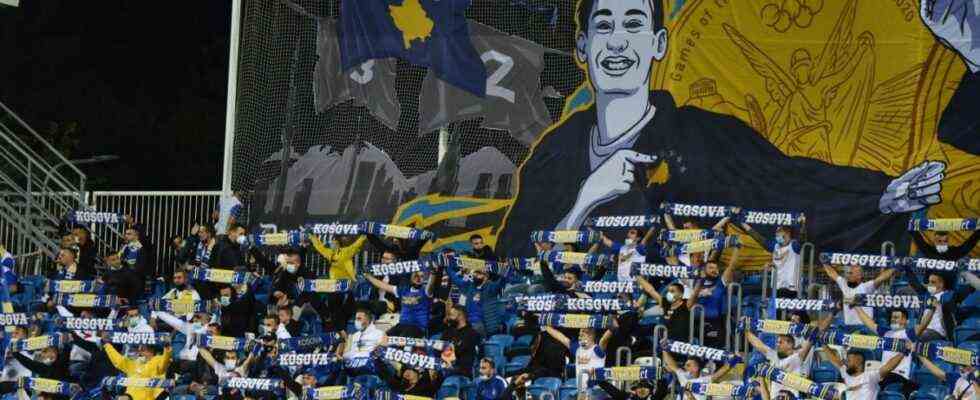The Fadil Vokrri Stadium is located in the middle of downtown Pristina. And if you wanted a foretaste of what the Spaniards could expect in their World Cup qualifier on Wednesday, you had to stop by on Sunday when the Kosovars saved a 1-1 draw against the Greeks in the last second in the World Cup qualifying. It served as a pattern in many ways.
Atmospheric, because the stadium can only be used to ten percent – because of Corona. But above all politically. Because Greece does not recognize the independence of Kosovo, which was declared in 2008. The Greeks have this in common with the Spaniards, among other things, so they can expect the Kosovar ultras to demonstratively stay seated on the uncovered back straight of the Vokrri Stadium when the tones of the Spanish national anthem sound. At least that’s how they did it on Sunday when the Hellenic song rang out. That’s not particularly nice, but at least not as crude as the whistles that were heard by the English fans during opposing anthems at the European Championships, for example. And it’s also far less martial than one might have suspected in the light of the writing on the back of the Ultras’ hooded sweaters. “Raised by war – stronger than fear” reads there.
The game of the Spaniards is associated with all kinds of contortions and animosities. When the Kosovars announced their independence from Serbia nine years after the end of the war, the Spaniards – like the EU countries Greece, Romania, Slovakia and Cyprus – refused to recognize the new entity. The reason, in short: Anyone could come; in the case of the Spaniards, for example, Catalans or Basques, where there are significant separatist tendencies. Those days gave birth to a curious alliance: the right-wing conservative Spanish Prime Minister José María Aznar and the now deceased Cuban head of state Fidel Castro viewed the unilateral declaration of independence as a fall from international law – as did China or Russia.
Unlike the USA, which at the time gave massive support to independence and later set up a gigantic military base there, and more than 100 other countries. The gratitude of the Kosovars towards the Americans can be seen not only in the cityscape, where a statue is dedicated to the former US President Bill Clinton, but also in the Fadil Vokkri stadium. There you can also see banners on which the blue Kosovar flag and the Stars & Stripes banner of the USA are interwoven. In the pedestrian zone of Pristina, US flags are for sale, as well as French and German, but not Spanish, which one is rather scratchy.
Before the first leg, Spain’s association did not call the opponent by name
That was already evident in the qualifying game in March, which Spain won 3-1 in Seville. At that time the tense situation culminated in boycott threats by the Kosovars. They were piqued because the Spanish association did not mention their country by name in the official announcements, but at the insistence of the government simply referred to it as the representation of “Kosovar territory”. For days it was speculated that the Spaniards would neither play the anthem nor hoist the flag of the country in Seville – in the end they obeyed the protocol instructions of the world football association Fifa. But: The employees of the state TV and radio stations in Spain were instructed to circumnavigate the word “Kosovo”. The reporters had to replace the three-syllable word with the much more bulky “Kosovar Association team” or “Kosovar territory”.
This time, too, it can be seen that Kosovo is something different for the Spaniards than an independent state. In the calendar of the Spanish national team, Kosovo appears abbreviated with three letters, but in contrast to all other teams that compete with Luis Enrique’s team, lowercase letters were used instead of capital letters. And according to the association’s accounts in the social networks, the “Selección” set out on Tuesday to fight for important qualification points in Pristina, not in “Kosovo”.
Spain has already dropped five points in the current qualification. Spain lost in Sweden on Thursday, after having only drawn one against Greece. Beyond that, however, this remains particularly curious: Spain’s association could have saved itself the contortions. If he had asked before the draw not to be drawn against Kosovo, as the Serbs did and they themselves too, in the case of Gibraltar, the British exclave on the Iberian Peninsula. But this is another story.

